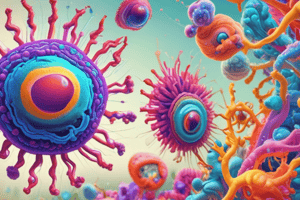Podcast
Questions and Answers
જીવનના સર્વાંગી કેમ છે?
જીવનના સર્વાંગી કેમ છે?
સેલ
સેલ થી આવેલા સેલ શું કહેવાય છે?
સેલ થી આવેલા સેલ શું કહેવાય છે?
બીજ
મેટી યુનિટ કેમ કહેવાય છે?
મેટી યુનિટ કેમ કહેવાય છે?
સેલ
સેલ થી સેલ ઉત્પન્ન થવાનો કેમ કહેવું?
સેલ થી સેલ ઉત્પન્ન થવાનો કેમ કહેવું?
સેલ સાથે સંબંધિત પ્રત્યેક ક્રિયા ક્યારે થાય છે?
સેલ સાથે સંબંધિત પ્રત્યેક ક્રિયા ક્યારે થાય છે?
કેલ થી સેલ વિશેષ કાર્યો કરવા માટે નિયત કરવામાં આવેલ છે?
કેલ થી સેલ વિશેષ કાર્યો કરવા માટે નિયત કરવામાં આવેલ છે?
પ્રાકૃતિક ચયન પર ડાર્વિનની કામગીરી શું છે?
પ્રાકૃતિક ચયન પર ડાર્વિનની કામગીરી શું છે?
પ્રાણીઓ દ્વારા પરસ્પર પ્રતિક્રિયાઓ પર એકોલોજીનું મુખ્ય ધ્યેય શું છે?
પ્રાણીઓ દ્વારા પરસ્પર પ્રતિક્રિયાઓ પર એકોલોજીનું મુખ્ય ધ્યેય શું છે?
કયા માહિતીની મદદથી પ્રજાતિની વિકાસની પૂરી પરિકલ્પના મળે છે?
કયા માહિતીની મદદથી પ્રજાતિની વિકાસની પૂરી પરિકલ્પના મળે છે?
એકોલોજીની સહાયથી મુદ્દોને સંભાવ્ય રીતે સંભાળવાનું કયું મુખ્ય લાભ છે?
એકોલોજીની સહાયથી મુદ્દોને સંભાવ્ય રીતે સંભાળવાનું કયું મુખ્ય લાભ છે?
કેટલા લાભો એકોલોજીની અધ્યયનો મળે છે?
કેટલા લાભો એકોલોજીની અધ્યયનો મળે છે?
પ્રાકૃતિક ચયન પર આધારિત પ્રજાતિક વિકાસ પ્રક્રિયા શું છે?
પ્રાકૃતિક ચયન પર આધારિત પ્રજાતિક વિકાસ પ્રક્રિયા શું છે?
Flashcards are hidden until you start studying
Study Notes
Exploring Science: A Journey Through Biology
Science is a broad field encompassing various disciplines through which we seek to understand our world and solve its mysteries. Among these branches of knowledge, biology occupies a central role, helping us comprehend the complexities of life itself—from tiny microbes to towering trees, from single cells to intricate ecosystems. Let's delve into some foundational aspects and key discoveries within this vibrant realm of biological science.
Cells: Building Blocks of Life
At the core of all living organisms lies the cell, the smallest unit capable of carrying out most essential functions needed for survival. In a typical human body, there exist around (3\times 10^{13}) or more cells, each performing specialized tasks that contribute to the body's overall wellbeing. Each cell contains genetic material (DNA), proteins, lipids, carbohydrates, and other molecules organized into distinct structures called organelles.
Cell theory, proposed by Matthias Schleiden and Theodor Schwann in the mid-nineteenth century, established three fundamental principles concerning cells: 1) All living things consist of one or many cells; 2) Cells arise only from pre-existing cells (cell division); and 3) Every function within a living thing occurs within cells. Despite being discovered over two centuries ago, new insights into cellular processes continue to flourish, providing valuable tools with potential therapeutic applications.
Evolution: Unlocking Nature’s Secrets
The concept of evolution stems from Darwin's groundbreaking work in the late nineteenth century regarding natural selection. This process involves differential reproduction rates based on traits conferring a benefit under specific environmental conditions. Over time, species evolve due to the accumulation of advantageous mutations, leading to adaptive changes passed down to subsequent generations.
Although often misconstrued or denigrated, the evidence supporting evolution is vast and multifaceted. Fossil records, comparative anatomy, embryological development, genetics, molecular biology, physiology, and ecology illustrate how diverse life forms have descended from common ancestors via a series of transitional steps. Understanding evolutionary patterns aids researchers in predicting future developments in species and exploring mechanisms behind disease resistance and susceptibility.
Ecology: Harmonizing Living Worlds
Ecology emerged during the twentieth century as scientists sought to understand interactions between living beings and their physical environment. It focuses on relationships among living organisms, including competition, predation, mutualism, parasitism, and commensalism, along with abiotic factors such as climate, soil composition, water availability, and pollution levels.
By studying ecological systems, researchers gain crucial information pertinent to managing resources sustainably, mitigating negative impacts associated with global change, preventing extinction events, protecting endangered species, and promoting biodiversity conservation efforts worldwide. Additional advantages of ecological studies entail uncovering novel bioactive compounds used in pharmaceuticals and developing innovative methods for agricultural productivity enhancement, waste management optimization, and the prevention of infectious diseases outbreaks.
In conclusion, biology offers profound insights into life's wondrous complexity, providing hope for improving public health outcomes, safeguarding our planet's natural heritage, ensuring food security, and fostering sustainable development across myriad domains. As new advancements emerge, so too do opportunities to explore the unknown, enhance human welfare, and promote scientific literacy, making it an exciting time indeed to embrace the study of life sciences.
Studying That Suits You
Use AI to generate personalized quizzes and flashcards to suit your learning preferences.




